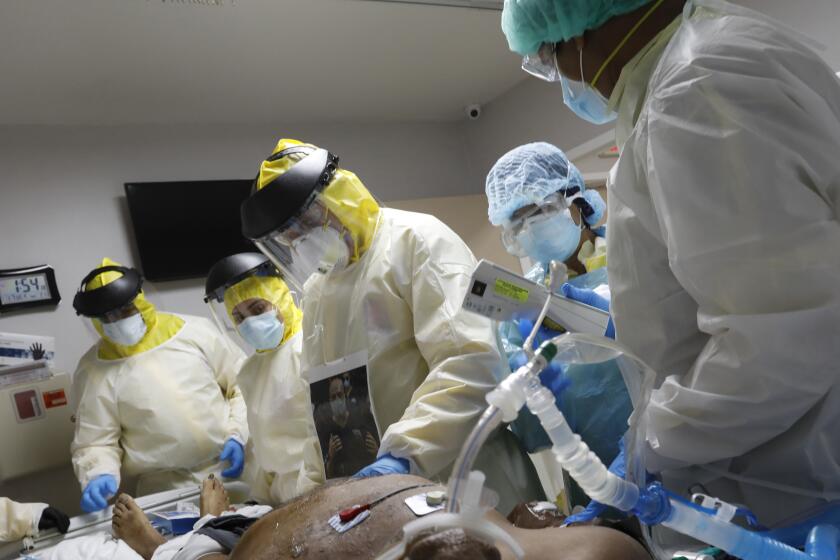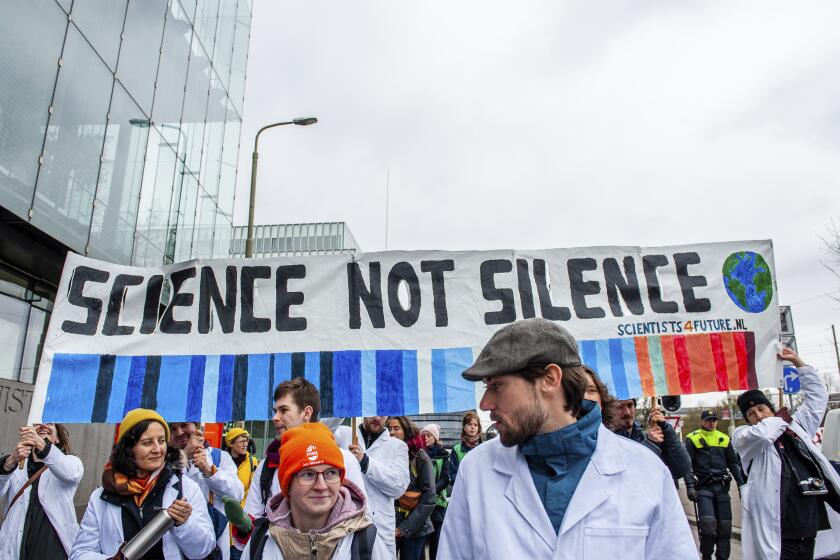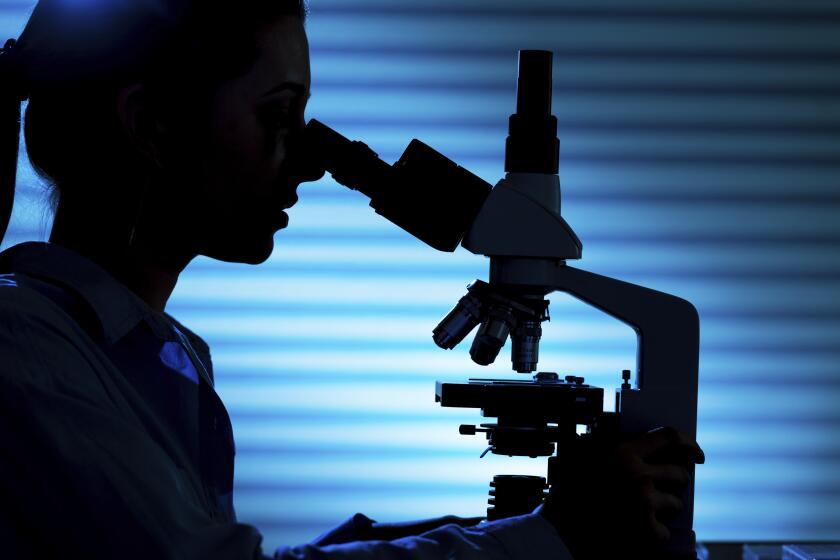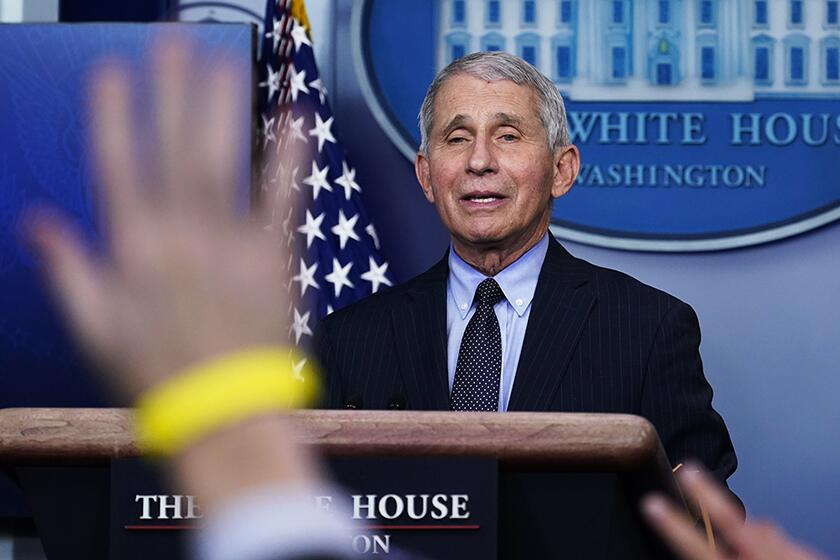Opinion: Scientists have become sitting ducks. We need leaders to step up and defend us
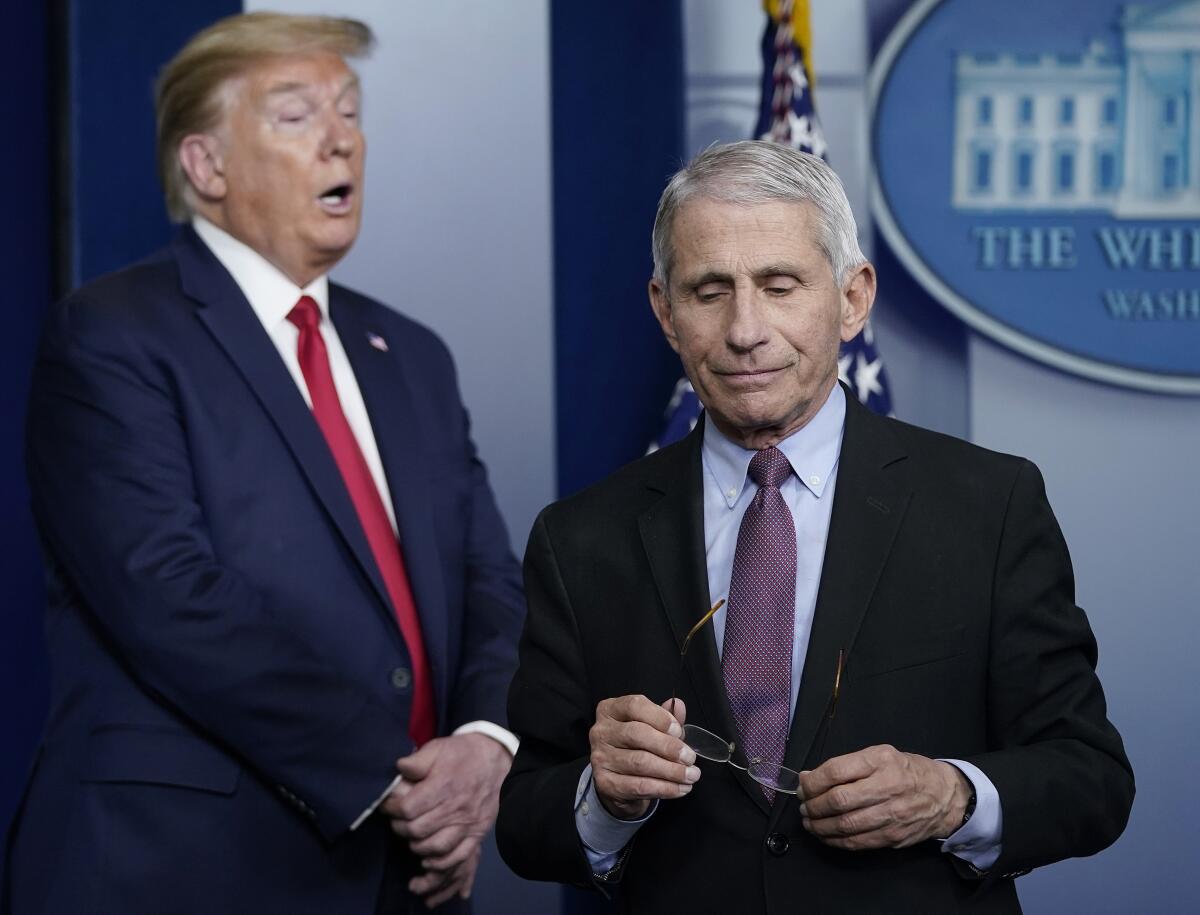
Nearly a century ago, when global dominance in scientific research began shifting to the United States from Europe, our nation built an empire firmly grounded in the natural sciences. America’s research universities and institutes flourished and provided the discoveries leading to the Manhattan Project, Silicon Valley’s tech industry, NASA and space exploration, vaccines to fight polio and other global infections, and new treatments for cancer, Alzheimer’s disease, diabetes and depression.
As a science envoy for the State Department, I saw first-hand how global leaders and technocrats admired the U.S. for its higher education system of scientific training and support. They spoke to me with pride about their time spent at U.S. universities or their hopes and aspirations that one day their sons and daughters might study here.
Worn down after being berated for two years, many providers are compromising long-standing practice norms.
I have devoted my life to vaccine science. During the pandemic, our team at the Texas Children’s Hospital and Baylor College of Medicine developed a low-cost COVID vaccine that was scaled for production in India and Indonesia, where almost 100 million doses were administered.
But here in the United States, thousands of Americans needlessly perished because they refused a COVID-19 immunization during our awful Delta wave in the summer and fall of 2021 and the BA.1 Omicron wave in the winter of 2022. Analyses by myself and colleagues have found that 200,000 unvaccinated Americans died during this period. Overwhelmingly, those deaths occurred in Republican strongholds, including 40,000 in my state of Texas. A closer examination reveals that the redder the county, the lower the immunization rates and the higher the death rates.
Traditionally, scientists have been discouraged from engaging in advocacy. But with the climate crisis, attitudes are changing.
The dead were victims of what we too often label as “misinformation,” as though these victims succumbed to random junk on the internet. This was not always the case. The unvaccinated were targeted by a well-financed and newly politicized anti-vaccine movement.
It accelerated at the CPAC conference of conservatives in Dallas in the summer of 2021, when prominent anti-vaccine activists were featured speakers and one Republican lawmaker from the House Freedom Caucus announced that vaccinations would lead to government confiscations of Bibles and guns.
Just before CPAC, another prominent Freedom Caucus member had disparaged vaccinators as “medical brown shirts,” meaning Nazis, and she later attacked me and other scientists by name on Steve Bannon’s podcast. Other caucus members regularly made unsupported and spectacular claims about the benefits of hydroxychloroquine or ivermectin as COVID treatments, while disparaging COVID-19 vaccinations.
Female scientists have a new worry about being women in the workplace — being judged for parenting captured by Zoom cameras.
Fox News piled on, misleading a huge swath of Americans. The partisan divide driving low COVID vaccinations and high deaths in 2021-22 was so profound that Liz Hamel of the Kaiser Family Foundation pronounced: “If I wanted to guess if somebody was vaccinated or not and I could only know one thing about them, I would probably ask what their party affiliation is.”
Now in 2023 the GOP Senate and House have intensified their efforts to promote conspiracies or denigrate science. Sen. Ron Johnson (R-Wis.) went on Fox News in August claiming the pandemic “was all pre-planned by an elite group of people.”
Partisan politics is not the only factor driving vaccine disinformation, but this aspect has become the most intractable and lethal. It is also uncomfortable to discuss. I was taught that science and politics do not mix, and that we scientists need to be neutral. But what happens when the data overwhelmingly demonstrate that thousands of Americans died from political targeting?
The questions of scientific inquiry — what do we know? how can we prove it? — can be an inoculation against authoritarianism.
During the 1930s, Joseph Stalin’s rise to authoritarian control relied on exiling or imprisoning prominent scientists. This had catastrophic consequences for Soviet productivity, especially in agricultural science.
Now American biomedical scientists have become targets. A 2021 survey found that 15% of scientists who engage with the news media about COVID-19 have received death threats. Another in 2022 found that almost 40% of COVID-19 scientists report experiencing at least one confrontation either online or in person, including death threats.
I’ve been singled out regularly by political extremists and Fox News anchors. Such statements reverberate and result in online threats or actual stalking.
How can America preserve its hard-earned dominance in science, especially given the volume of recent attacks on biomedicine?
First, we must protect biomedical scientists. So far there have been few public statements of support from any branch of the U.S. government, and our university leaders and scientific societies are mostly silent. There are no organizations on which biomedical scientists can depend for legal help if they are targets of public smear campaigns. This silence could well shape the plans of young people now choosing careers, as they see how scientists are treated in America.
The U.S. must also recognize how anti-science rhetoric has emerged as a new lethal force and find mechanisms to halt its advance. Pseudoscience carved a path of destruction in the U.S.S.R. almost 100 years ago, and now it is happening again. Beyond the 200,000 deaths that have already occurred, as activism against COVID vaccines morphs into panic about all immunizations, we could see the return of catastrophic childhood infections such as measles or polio. The fact that polio genomes have been detected recently in the wastewaters of New York and London is an ominous warning. Over the last two decades we made steady progress in vaccinating the world’s children, with impressive declines in pediatric deaths. But those gains are fragile.
We must find ways to preserve our achievements in biomedicine and support scientists, even if that means both the scientists and those in positions of power engage political leaders and challenge ideologues to reject their anti-science rhetoric and agenda. Otherwise, almost a century of America’s preeminence in science will soon decline, our democratic values will erode, and our global stature will fall.
Peter Hotez is a professor and dean at Baylor College of Medicine and co-director of the Texas Children’s Hospital Center for Vaccine Development. He is the author, most recently, of “The Deadly Rise of Anti-Science: A Scientist’s Warning.”
More to Read
A cure for the common opinion
Get thought-provoking perspectives with our weekly newsletter.
You may occasionally receive promotional content from the Los Angeles Times.
